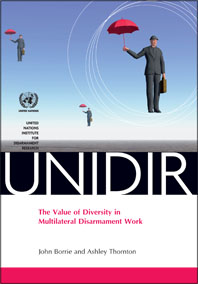Success has been hard to attain in multilateral disarmament and arms control work in recent years. Serious political problems exist, but these are not the only difficulties. The unintended consequences of past practice, or the complex challenges those involved must deal with, can be obstacles to progress. Aspects of multilateral disarmament practice may compound cognitive challenges that individuals face in managing their perceptions and interactions with others in negotiating environments. While there is no way to ensure success in disarmament endeavours, multilateral practitioners can improve the chances by recognizing and harnessing cognitive diversity, as humanitarian perspectives in disarmament processes have shown. This book discusses practical suggestions to help achieve this.
Citation: John Borrie and Ashley Thornton (2008). "The Value of Diversity in Multilateral Disarmament Work", UNIDIR, Geneva.
